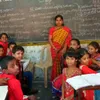My name is Gorelal and I am 18 years old. I was born in Gaya district in Bihar. My father passed away when I was young. Having lost our only income, we were soon living in abject poverty.
In 2014, a relative of ours who knew about our condition convinced my mother to send me to Jaipur to study and work. He gave her an advance of Rs 2,000 and said he would accompany me there and help me settle in. Throughout our train journey, he kept reassuring me that everything would be fine once we got to Jaipur, and that my life was about to improve.
However, once we got to Jaipur, he dropped me off at a factory and left. I never saw him again. It was the beginning of a nightmare. I was made to work day and night with no breaks, and no proper food
or water.

According to a Campaign Against Child Labour (CAC) study, India has 1,26,66,377 child labourers.
Representational image (via Deccan Herald)
I was living in a tiny room with 11 other children. This was the same space in which we worked and when we did manage to sleep, we were inhaling all the dust and toxic material we worked with. All of us were physically exhausted. If we expressed any desire to go home or speak with our parents we were beaten mercilessly.
One day, I was taken out of the factory by the owners, who wanted me to help them collect some things. I saw an opportunity and decided to run. So, I kept running till I found a police officer who took me to the station. I collapsed at the police station in exhaustion but I managed to tell them everything.
I later found out that he and his team had managed to rescue all the other children at the factory. I remember at that time I felt ‘badiya’. After months of feeling scared, I finally felt like we all had a chance to go home and restart our lives.
Initially, we were sent to a ‘balgiri’ (a children’s shelter) where we underwent a medical examination. We were badly bruised from the beatings, and showed signs of malnourishment and trauma.
We stayed in the ‘balgiri’ for some time and received the medical attention we needed. After a few days, when I had recovered slightly, I was taken back to Gaya. Once I was home, my rehabilitation started.
Rehabilitation is never an easy process. It took a lot of trauma counselling to help me overcome what I had gone through. I also realised my mother never got any money for the work I had done and neither had I. She thought I had been studying and did not know about what I went through. My family was horrified when they found out.
It has been a tough journey for me but I am doing better. I am part of a larger group of survivors, Center Direct and The Indian Leadership Forum Against Trafficking, and am very active in preventing trafficking in my locality. I have sensitised them about what they need to be careful of, how traffickers will lure them into thinking they will have a better life and whom they can report these incidents to.
I am also stressing the need for anti-trafficking units – this is especially important considering the pandemic and how it has left so many children vulnerable to exploitation and trafficking.
While some of us are getting married off early to ease the financial burden on families, some of us are being made to work for minimal or no wages to mitigate the dire financial situation at home. Many of us are being sold to work in bangle factories, sweatshops, brothels, and brick kilns.
The fact that we are no longer going to school has only deepened the gap between us and our urban counterparts – setting us back significantly. Labour contractors are stalking desperately impoverished villages for cheap labour, which is dangerous for us.
Right now, anti-trafficking units, specialised cells that investigate trafficking cases effectively are our best bet in ensuring we are able to tackle the horrors of trafficking effectively.
Edited by Diya Koshy George

![[Survivor Series] We need strict laws to tackle the horrors of trafficking effectively](https://images.yourstory.com/cs/5/f5a7f3304b1211e9b6645b8ae897d03e/02-1609756076542.png?mode=crop&crop=faces&ar=2%3A1&format=auto&w=1920&q=75)





